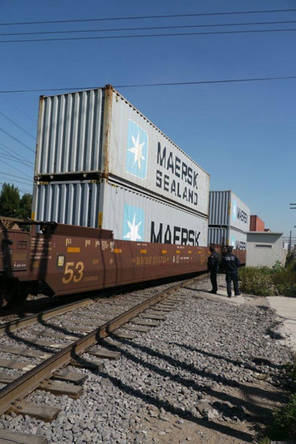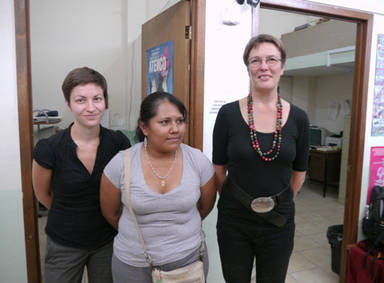Human rights in Mexico Diary
Migrant hub & poisoned gold
Saturday 6th October
"Migrant Hub"
A large number of people are migrating from Central American countries to the USA due to the catastrophic situation in their home countries. One possibility to cross Mexico is to jump on cargo trains. In the North of Mexico City many railroads converge and the migrants use this "hub" to change trains and to relax for a few days. Many of them get hurt as they jump on our off the trains. They cannot sleep on the trains because of the danger of falling off the train. Some NGOs opened a shelter three months ago at the hub next to the railways after another shelter run by the church had to close down. In the shelter that consists mainly of plastic sheeting the migrants can rest a little bit from their long, tiring and dangerous journey. Mexican law does not allow the police to enter the migrant shelter in order to readmit the "Illegals".

Thursday 4th & Friday 5th October
Poisoned gold
In the little town San Jose del Progreso a Canadian company started some years ago to explore and exploit silver and gold. Since the company entered the village, conflicts have erupted and are ongoing today. The situation is very complex. In a nutshell, the initial problem was that the company started exploring the mine without previous consultation with the inhabitants. They apparently also bribed the local government. While the company is each day extracting metal worth 5 million peses, the village is split: a small part of the village including the mayor is in favour of the mine, either because they are profiting from the “financial support” of the company or they found work in the mines. The large majority of the village is however opposing the mine. This is leading to violence, harassment and even murder. At the beginning of this year two activists were killed and several seriously hurt. The victims complain that the government of Oaxaca is not supporting them enough. 
Wednesday 3rd October 2012
Meeting with the government

Tuesday 2nd October 2012

Monday 1st October 2012
Feminicides continue

After returning to Mexico City we spend the day mainly meeting with NGOs that deal with the worrying human rights situation in the country. Crucial to the day is a late evening meeting with David Peña, lawyer of the families of Bety Cariño and Jyri Jaakkola, both of whom were killed on 27th August 2010 in the state of Oaxaca by a government-associated paramilitary group. They were taking part in a humanitarian caravan that wanted to bring medicine to the indigenous village San Juan Copala. Since then Satu Hassi and Ska Keller have followed the case. As Jyri was Finnish, the case attracted international attention and chances for a full and just process are higher than in the other cases of fatal attacks on human rights activists. At least that is what we hope. Until recently, the judicial authorities in Mexico did not really do anything, other than small steps when MEPs were present. But after the discussion with David Peña we are a little bit more optimistic. The authorities seem to be moving on this case.
The discussions with activists who deal with the uncountable number of killings of women in Mexico confirmed that these "feminicides" continue. For over a decade the Mexican government has been internationally criticised because of the lack of real prosecutions of these crimes. Almost none of the murder cases makes it to a Mexican court, even though the Inter-American Court on Human Rights obliged the Mexican government in a ruling in 2009 to seriously investigate and take measures to stop feminicides.
Instead of being reduced though, the opposite has taken place. Since President Felipe Calderón began the so called “war on drugs” in 2006, violence against women has escalated along with violence more generally. NGOs report that violent attacks against women increased by 300%. That the new President Peña Nieto will improve the situation is not very likely: in the federal state where he was previously Governor, feminicides increased greatly during his term.
----------------------------------------------------------------
Sunday 20th September 2012
Impunity in Guerrero
We travel to the federal state of Guerrero and meet there several human rights organisations and victims of human rights violations. Guerrero is one of the poorest of the Mexican states and is at the same time one of the regions where the so called war on drugs is extremely violent. Violence is unfortunately nothing new in Guerrero. The state has been dominated by the military ever since the 1970s. In this time it was deployed against armed leftist groups and alleged Guerilla fighters. The militarisation of the society and the repression by the army have led to a huge number of desaparecidos forzados (disappeared persons). As of today there has still been no properly solved case and it is only in recent years that the Mexican government finally recognised the existence of the phenomenon. In this context, the activist Tita Rodilla told us of her fight with the Mexican legal system to reach justice for her father. Protracted by the military, her ongoing fight has already lasted for over 30 years.
Today the army is still in control of the land and society, under the pretences of the war on drugs. While in other Mexican states the drug war targets the control of transit routes, cultivation of drugs plays a very big role in Guerrero.

However, instead of protecting the people from the gangs, the military is deeply involved in the violence, often with impunity. One of the few victims to raise her voice is Valentina Rosendo, who was raped by soldiers. Despite harassment and threats that have forced her to move several times and live in constant fear, she has continued her fight for justice. When her case finally ended up at the Inter-American Court of Human Rights, it sided with Valentina. The government had to finally formally present its excuses. This is a great success – but the offenders have still not been sentenced and there has not yet been a formal process in Mexico.
These two examples are symbolic of the high rate of impunity that pervades life in Guerrero and all over Mexico.
--------------------------------------------------------------------------
Human Rights defenders under siege
The number and severity of human rights violations in Mexico has increased dramatically during the last years. Kidnapped journalists, beheaded corpses and terror against the population are a daily occurence. Moreover, the massive military presence in the context of the "war on drugs" has not led to more security but on the contrary, to a deterioration of the situation in many places.
The case of the deaths of human rights defenders Betty Carino and Finnish national Jyri Jaakkola shocked the world in 2010. A human rights caravan they were a part of tried at that time to protect the indigenous community of San Juan Copola in the state Oaxaca from paramilitary assault. It was itself attacked and Betty and Jyri were killed. As of today, there have still been no convictions.
As well as indigenous people, women, human rights activists and especially migrants are victims of arbitrary violence. Often, they travel through Mexico from Central American countries on their way to the USA. In Mexico, they experience kidnapping, blackmailing and even murder and can count on the state even less because of their "illegal" status.
Green MEPs Satu Hassi and Ska Keller will meet and talk to victims and human rights activists to become more informed about the most recent situation. Equally, they will meet with representatives of the outgoing and new government in order to put pressure on them to speed up the ongoing investigations concerning human rights violations. Solving the case of Betty and Jyri must play a key role in that.





